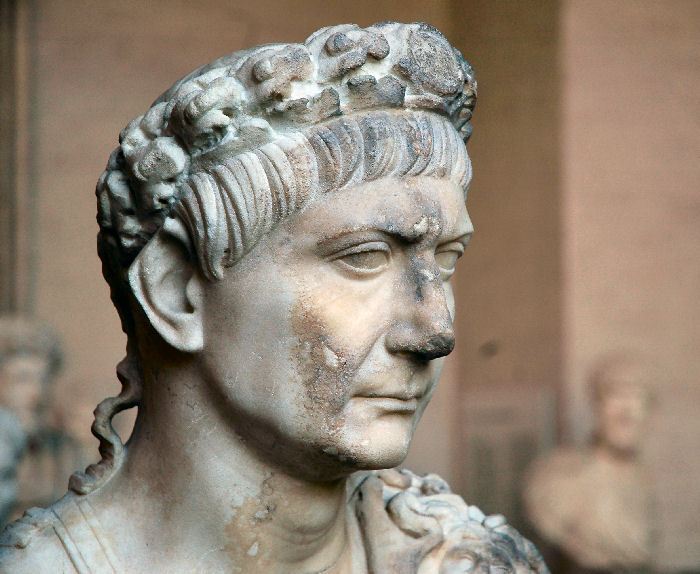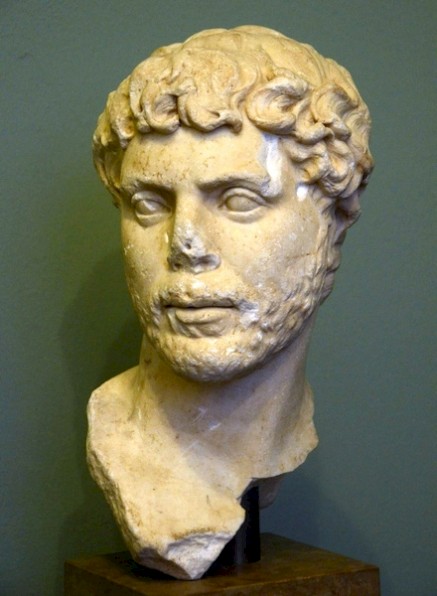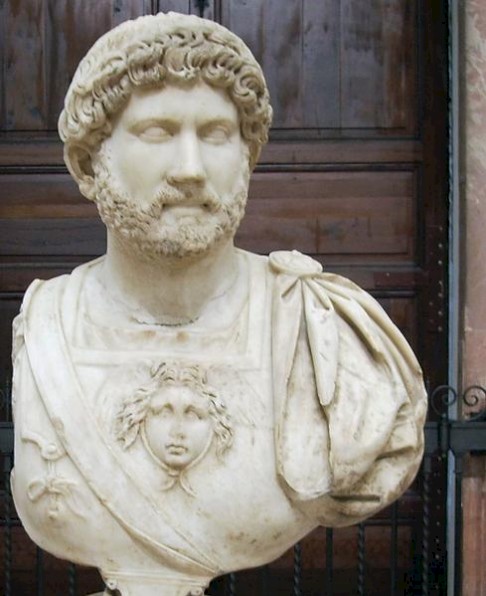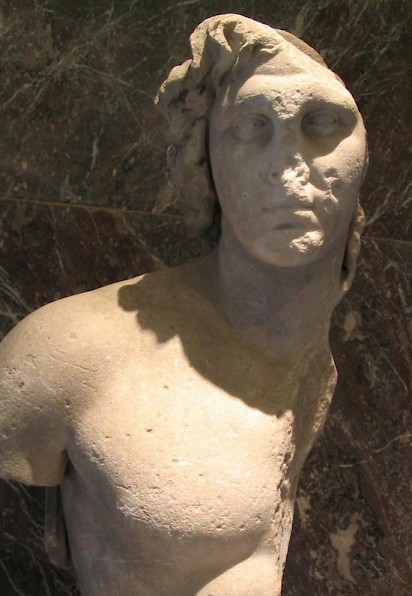Arrian - Livius (original) (raw)
This page is a stub. It will be expanded to a full-fledged article.
Arrian of Nicomedia (c.87 - after 145): Greek historian and senator of the Roman empire, author of several historical studies. His best-known work is the Anabasis, which deals with Alexander the Great.
Life
Roman, second quarter of the second century
Lucius Flavius Arrianus - or Arrian, as he is usually called in the English language - was born in Nicomedia, one of the Greek towns in the Roman empire, between 85 and 90 CE. The city, modern Izmit, was the capital of ancient Bithynia and one of the foremost towns of early Christianity.
His parents must have been well to do, because they were Roman citizens. Now the citizenship and family name "Flavius" were frequently given in the years between 70 and 96, but the receivers were always called Titus Flavius, not Lucius. We can be confident that Arrian's ancestors had received citizenship and name at an earlier stage. (The possibility cannot be excluded that the family received it from Lucius Flavius Silva, who was to capture Masada in 74 [more], but the main argument for this hypothesis is that he is almost the only known Lucius Flavius in the first century - which probably says more about the gaps in our knowledge.)
Whoever awarded the family citizenship, the family must have been important among the Bithynians. Another indication is that perhaps already as a young man, Arrian held the priesthood of Demeter and Kore, the most important in Nicomedia.
Arrian read philosophy in Nicopolis, where the famous philosopher Epictetus (c.50-c.125 CE) had a small school. Among his students was the future emperor Hadrian, who was to be Arrian's lifelong friend. The young Nicomedian later published some of his master's teachings. In these years, he was also initiated in the Mysteries of Eleusis near Athens. Not surprisingly: they were dedicated to Demeter and Kore.
As a rich man with a sense of responsibility, Arrian wanted to do something for society. He had to pursue a senatorial career, and must have served as an officer in one of the legions in c.107. Arrian makes one brief remark in his Cynegeticus that has been interpreted as a reference to his tour of duty. It has been argued that he was active as a cavalry officer in Noricum (modern Bavaria), because he knows this quiet region very well. On the other hand, the man from Bithynia was later given the command of two legions, which means that he had more than a passing military experience. It is therefore equally possible that he was active in Dacia, which had recently been occupied by the emperor Trajan and was now being pacified by Arrian's friend Hadrian.
Arrian must have caught the eye of the Roman governor of Greece, Gaius Avidius Nigrinus, and was one of his advisors in a boundary dispute that is known from an inscription from Delphi. The incident can be dated in c.110. At the same time, he must have learned about the trials against the Christians in Nicomedia conducted by Pliny the Younger.

Trajan
Usually, the next step was the quaestorship, which was held at the age of twenty-five when one had a very powerful patron, and the aedileship, two years later. This was the normal career, and it may be assumed that Arrian occupied these positions, but it must be stressed that there is no positive evidence that he was either quaestor or aedile. If he stayed in his home country, he survived the earthquake that destroyed Nicomedia in 120. He must have spent lavishly for its reconstruction. Maybe excavations in Izmit will one day give more information on this subject.
By now, his friend Hadrian had become emperor (117), and Arrian admits that he benefited from his friend's patronage. He may have become praetor (in the early 120s) and was very probably proconsul (governor) of Andalusia (c.125). Perhaps he was in Africa in 128, when Hadrian visited this province. It cannot be proven, but one hunting scene in Arrian's Cynegeticus suggests autopsy.
Until now, our reconstruction of Arrian's career was more or less speculative. However, we are absolutely certain that he was consul in 129 or 130, together with a man named Severus. Because the emperor was in Greece and Egypt, Arrian and Severus had several really important duties in Rome.
After this office, he was made governor of Cappadocia, a frontier province with two legions. This appointment proves that Arrian had more military experience than we know of, because no Roman emperor would ever give the command of two legions to man without experience. If Arrian had not taken part in Hadrian's mopping-up operations after the conquest of Dacia, it is possible that he took part in Trajan's campaign against the Parthian empire (115-117), which Arrian commemorated in a long history.
Hadrian, bust from Italica
One of his first acts as governor was a voyage of inspection along the shores of the Black Sea, about which he wrote a book. In 134, the Alans, a tribe from the steppes of Kazakhstan, threatened the Parthian and Roman empires. The governor of Cappadocia took his two legions XV Apollinaris (stationed at Satala) and XII Fulminata (stationed in Melitene) into the field and defeated the invaders before they could become dangerous. He was later to publish an Order of battle against the Alans, in which he offered advice to other Roman commanders on fighting against nomads (which is one of the few surviving sources on the marching order and battle formation of the Roman army).
After 137, Arrian left his office and settled in Athens, where he became an honorary citizen. He died after 145/146, because he is known to have occupied an important Athenian office in that year.
Writings
In spite of his dazzling career in the Roman government, Arrian found time to write many books, which are generally modelled on the publications of the Athenian author Xenophon (c.430-c.354). A catalogue shows his philosophic, topographic-ethnographic, historical, and military interests, which culminate in his books on Alexander.
- eight books of Diatribes, containing the teachings of Epictetus (four books survive);
- twelve books containing Epictetus' conversations (lost);
- a Manual of Epictetus' philosophy, also known as Encheiridion (probably the most popular work of ancient philosophy through the ages);
- a Meteorology - the study of the skies were considered part of the usual philosophical curriculum (lost, although a handful of fragments survive);
- a History of Bithynia until the annexation by the Romans in eight books (lost; excerpt);
- a History of the Parthian wars in seventeen books, of which ten were devoted to the war conducted by Trajan in 115-117 (lost; an excerpt survives);
- the Periplus, a description of the Black Sea in twenty-five books, written before 132 (parts survive, which contain the oldest reference in Greek to "we Romans"; a fragment is here);
- an Order of battle against the Alans, a military handbook on the best tactics in a war against nomads (partly surviving);
- another work on the Alans (lost);
- a book on military tactics, written in 136/137 as a present to Hadrian, who was celebrating his twentieth anniversary as emperor (the part on cavalry survives);
- biographies of Dion of Syracuse, Timoleon of Corinth and a Bithynian bandit named Tilliborus (all lost);
- a book on hunting called Cynegeticus;
- the seven books of the Anabasis: the history of Alexander's march into Asia (excerpt);
- the Indikê (one book), telling about the marvels of India and the voyage home of Alexander's admiral Nearchus (this work is far more romantic than the sober description of the Black Sea);
- the ten books Events after Alexander, known from a Byzantine summary.
His writings earned him the nickname "Second Xenophon" and he modestly called himself "the Alexander among writers". As a historian, his aim was to present his readers with the truth and to praise deserving people in a worthy style. Being a philosopher, however, he often takes the opportunity to comment upon or criticize his subjects.
Anabasis
Arrian's Anabasis ("journey up-country") is our most important source on the reign of Alexander. The reason is that Arrian ignored Cleitarchus' immensely popular History of Alexander and used other, better sources. In the prologue, Arrian explains why:
It seems to me that Ptolemy and Aristobulus are the most trustworthy writers on Alexander's conquests, because the latter shared Alexander's campaigns, and the former -Ptolemy- in addition to this advantage, was himself a king, and it is more disgraceful for a king to tell lies than for anybody else.
Alexander the Great. Portrait from Delos
Few modern scholars will be impressed by the last remark,note[It may be noted that this line is also quoted by Synesius of Cyrene (In praise of baldness, 15), who cannot have read the Anabasis. It is possible that Arrian's remark is a quotation from a remark by Ptolemy himself.] but all of them agree that Arrian chose the right sources for the right reason: Ptolemy and Aristobulus had been eyewitnesses. However, Alexander had read more than these two authorities and offers sometimes stories that he had not found in these authors. One of these sources is Nearchus.
Another quality is that he knows what he is writing about. He knew what it meant to fight a war, had been a provincial governor and had lived at the imperial court. Moreover, the war against the Parthians -if he had taken part in it- had offered him an opportunity to visit Mesopotamia, and he may have visited places like Gaugamela and Babylon. To Arrian, it seemed that all his life had been a prelude to the writing of this work: in the prologue, he says that to him, the literary activity was his country and his family and his countless public offices, and had been right from his youth.
Like Cleitarchus, Arrian tried to give some sort of assessment of Alexander, but his opinion is the opposite of Cleitarchus', who had presented the Macedonian king as a young prince corrupted by his constant success. Arrian, on the other hand, admires Alexander, although he is too much of a philosopher to be completely uncritical. Sometimes, he condemns aspects of the conqueror's behavior, but as a whole, he is positive about Alexander's achievements.
A typical part of the Anabasis is Book Four, where Arrian places three painful incidents together and condemns Alexander's behavior. Chronologically, two of them do not belong at this place, but by treating them together, Arrian has prevented the reader from coming up against the hard facts too often.
As we noticed in the catalogue above, Arrian also published an Indikê, which is essentially an appendix to the Anabasis. This remarkable text probably tells less about India than about the literary tastes of Arrian's age. To start with, it is largely based on the Indikê by Alexander's fleet-commander Nearchus. (The first chapters are derived from Megasthenes, a Greek envoy who visited Patna.) More recent descriptions of India are quoted by several Christian authors and Arrian's younger contemporary Philostratus, but Arrian chose to ignore these recent sources because they were written in Koinê-Greek, which was considered ugly in the second century CE. Nearchus, on the other hand, had written decent "classical" Greek and even though the contents of his Indikê were outdated, Nearchus was to be preferred. A second point is that Arrian choose to write his own Indikê in the Ionian dialect. This was done because the classical text on geography, the Histories of Herodotus of Halicarnassus, were written in that dialect and contained no reliable information on India.
Arrian also wrote a book on the Events after Alexander. It covered the years until the conference at Triparadeisos, where Alexander's empire was divided. The text is known from a summary by the Byzantine patriarch Photius (c.815-897), and breaks off rather abruptly. Maybe this work remained unfinished.
It is a tribute to the quality of these works and their author, that modern scholarship usually follows Arrian, who personifies the "good" tradition, and merely adds details from the authors of the "vulgate" tradition of Cleitarchus. It is only since the publication of the Astronomical diary (1988) that oriental texts are receiving attention. Alexander as we know him was, until recently, very much a creation by Arrian.


